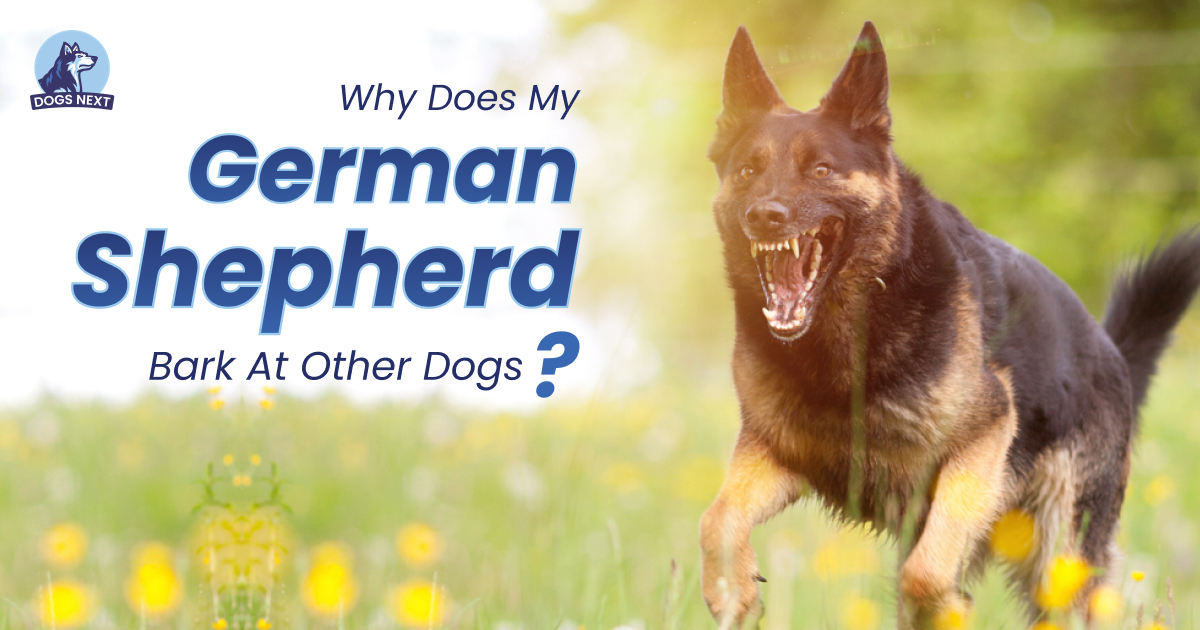German Shepherds are intelligent, loyal, and protective dogs, making them a popular choice for pet owners. However, their protective nature can sometimes lead to excessive barking, especially when it comes to other dogs. Some possible reasons are Lack of socialization, Territoriality, Protective instincts, Fear or anxiety, and Playfulness.
As a pet owner, it’s important to understand why your German Shepherd barks at other dogs and what you can do to address this behavior.
In this article, we will explore the reasons why German Shepherds bark at other dogs, provide tips for managing this behavior, and share how you can help your furry friend overcome their fear or aggression towards other dogs. So, if you’re struggling to deal with your German Shepherd’s barking behavior, keep reading to learn more.
Understanding Your German Shepherd’s Nature
German Shepherds are intelligent and loyal dogs that have been bred for various purposes over the years. Understanding their nature and instincts is crucial to having a successful relationship with them. Here are some key points to keep in mind:
| Traits | Description |
| Protective Instincts | German Shepherds are known for their protective nature, which can sometimes manifest as barking at other dogs. |
| High Energy Levels | German Shepherds are energetic dogs that require plenty of exercise and playtime. |
| Strong Prey Drive | German Shepherds have a strong prey drive and may chase small animals or other dogs. |
| Intelligence and Trainability | German Shepherds are highly intelligent and can be trained to perform various tasks. |
It’s important to keep these traits in mind when training and caring for your German Shepherd. Providing them with plenty of exercises and mental stimulation can help prevent problem behaviors such as excessive barking.
Socializing them from a young age can also help them feel more comfortable around other dogs. With patience, consistency, and love, you can build a strong and rewarding relationship with your German Shepherd.
Reasons Why Your German Shepherd Barks at Other Dogs
Breed Characteristics
German Shepherds are known for their territorial instincts, protective nature, and high energy levels. These traits make them great watchdogs and protectors, but they can also lead to aggressive barking toward other dogs.
German Shepherds are bred to be alert and protective, which can cause them to become overly reactive when they perceive a threat to their family or territory.
Fear and Anxiety
One of the most common reasons why German Shepherds bark aggressively at other dogs is fear and anxiety. German Shepherds are sensitive animals and can become anxious or scared in unfamiliar situations or when confronted with a new dog.
This anxiety can manifest in aggressive barking, which is the dog’s way of trying to protect themselves or their family from a perceived threat.
Socialization and Training
Socialization and training are crucial in preventing and addressing aggressive barking behavior in German Shepherds. Socialization involves exposing your dog to different situations, people, and animals, which can help them feel more comfortable and less anxious in new environments.
Training can help you teach your German Shepherd appropriate behaviors and responses, such as how to interact with other dogs calmly and non-aggressively.
Health Issues
Sometimes, underlying health issues can cause a German Shepherd to bark aggressively at other dogs. For example, chronic pain such as hip dysplasia can cause a dog to become irritable and more prone to barking.
Similarly, vision impairment can make it difficult for your dog to identify other dogs, which can cause them to react aggressively out of fear or confusion. If you suspect that your German Shepherd’s aggressive behavior is due to a health issue, consult with your veterinarian for proper diagnosis and treatment.
German Shepherd Barking Age
German Shepherds, like all dogs, go through various developmental stages as they grow older. Here’s a brief overview of how their barking behavior may change with age:
| Age Range | Barking Behavior |
| Puppyhood (up to 6 months) | German Shepherd puppies may bark to get attention or express excitement. They may also bark out of fear or anxiety. |
| Adolescence (6-18 months) | During adolescence, German Shepherds may become more vocal as they assert their independence and test boundaries. |
| Adulthood (1-7 years) | As adult dogs, German Shepherds may bark to protect their territory or alert their owners to potential threats. |
| Senior years (7 years and up) | In their later years, German Shepherds may bark less frequently due to decreased energy levels and physical ability. |
It’s important to remember that every dog is unique and may exhibit different behaviors at each stage of life. However, understanding these general patterns can help you better anticipate and manage your German Shepherd’s barking behavior at different ages.
Tips for Managing Your German Shepherd’s Barking
| Tips | Description |
| Proper Training | Training your German Shepherd to obey commands can help control their barking. Teach them basic commands such as “sit,” “stay,” and “quiet.” |
| Consistent Socialization | Socializing your German Shepherd with other dogs from a young age can help them feel comfortable around other dogs, reducing their barking behavior. |
| Positive Reinforcement | Reward your German Shepherd for good behavior and ignore their barking behavior. This positive reinforcement will encourage them to repeat good behavior. |
| Exercise and Playtime | Make sure your German Shepherd is getting enough exercise and playtime. A tired dog is less likely to bark excessively. |
| Seeking Professional Help | If your German Shepherd’s barking behavior is severe and cannot be managed with these tips, consider seeking professional help from a dog trainer or behaviorist. |
By following these tips, you can help manage your German Shepherd’s barking behavior and promote positive interactions with other dogs. Remember to be patient and consistent with your training, and always reward good behavior.
Frequently Asked Questions
Q: Why does my German Shepherd bark at all dogs?
Ans: German Shepherds may bark at other dogs due to territorial instincts, fear or anxiety, lack of socialization, or negative past experiences.
Q: How do I stop my German Shepherd from reacting to other dogs?
Ans: Proper training, consistent socialization, positive reinforcement, exercise, and seeking professional help are all effective ways to manage and reduce a German Shepherd’s reactivity to other dogs.
Q: What does it mean when my dog barks at other dogs?
Ans: When a dog barks at other dogs, it may be a sign of territorial behavior, fear, anxiety, or aggression. It’s important to assess the situation and identify the underlying cause of the barking.
Q: Can you train a German Shepherd not to bark?
Ans: Yes, German Shepherds can be trained not to bark excessively through proper training, consistent socialization, positive reinforcement, and seeking professional help if necessary.
Q: How to stop a German shepherd barking at night?
Ans: To stop a German Shepherd from barking at night, make sure they have enough exercise and mental stimulation during the day, establish a consistent bedtime routine, provide a comfortable sleeping environment, and address any underlying anxiety or fear issues.
Q: How to stop my German Shepherd from barking at strangers?
Ans: Proper training, consistent socialization, positive reinforcement, and addressing any underlying fear or anxiety issues can help stop a German Shepherd from barking at strangers. It’s important to teach them appropriate behavior and reward calm and relaxed behavior around strangers.
Conclusion
Aggressive barking behavior in German Shepherds towards other dogs can be concerning, but understanding the reasons behind it can help you address it effectively. Whether it’s due to their breed characteristics, fear, anxiety, or underlying health issues, there are steps you can take to prevent or correct the behavior.
Socialization and training are critical, but it’s also important to consult with a professional trainer or veterinarian if necessary. With patience, consistency, and proper training, your German Shepherd can learn to interact with other dogs appropriately and become a well-adjusted, happy companion.

I’m David, an expert contributor and writer, with two furry friends of my own, I know the challenges of raising and caring for dogs. From training to nutrition and health, my goal is to provide valuable insights and advice to help create strong bonds and happy, healthy lives. Find me in Twitter.




